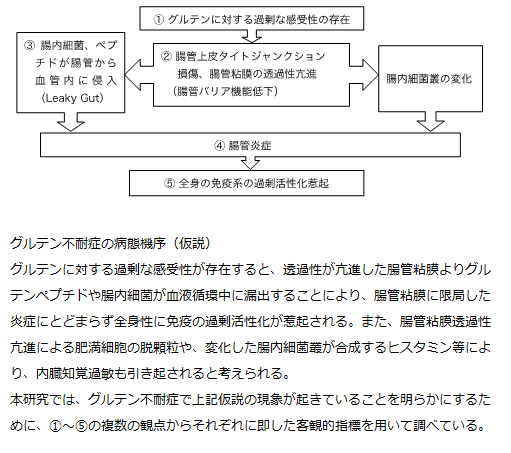Research into the reality of gluten intolerance and mental health
Information updated: July 31, 2023
- Seeds Information
- Researcher Information
- What do you expect from collaboration with companies?
- Contact for this research
Seeds Information
keyword
Schizophrenia, depression, gluten, gluten-free diet, immunity
Field
Central
Overview
Gluten is a protein produced from wheat and plays an important role in making wheat products such as udon and bread. Gluten intolerance is an excessive sensitivity to gluten, and ingesting gluten causes various physical and mental symptoms such as abdominal pain, diarrhea, headache, brain fog, fatigue, depression, and anxiety. There are many unknowns about gluten intolerance, and diagnostic criteria have not yet been established. Although a comprehensive diagnosis based on symptoms and objective biomarkers is necessary, the current situation is that diagnoses are made based only on subjective symptoms. The pathological mechanism of gluten intolerance is also unknown, but it has been suggested that it is related to overactivation of the immune system. We established Japan's first gluten specialty outpatient clinic in 2019 and have been conducting specialized medical treatment and research on gluten intolerance. So far, we have revealed that a high proportion of gluten intolerant patients have anti-gliadin antibodies, and that a high proportion of patients have not only physical symptoms but also mental symptoms such as depression and anxiety. Currently, we are conducting objective evaluations of gluten intolerance patients using various markers such as antibodies and cytokines from the perspective of intestinal mucosa and inflammation, with the goal of clarifying the relationship with clinical background and establishing diagnostic criteria. Furthermore, we will investigate the changes in physical and mental symptoms and serological markers when gluten-intolerant patients consume a gluten-free diet, and clarify the effectiveness of treatment.
What's new?
Our research group is the only one in Japan conducting treatment and research on gluten intolerance, and this is the first attempt to clarify the actual situation of gluten intolerance and verify the therapeutic effects of a gluten-free diet.
What are its advantages over other studies?
The study is conducting objective evaluations of gluten intolerance patients using various markers such as antibodies and cytokines in terms of intestinal mucosa and inflammation, and is attempting to clarify the relationship with clinical background.
What problem does it help solve?
This will be the first time that objective diagnostic criteria for gluten intolerance, which causes a variety of physical and psychological symptoms, has been established. If a dietary treatment is established, it will be possible to provide early and appropriate diagnosis and treatment.
Possibility of other applications and developments
To provide an effective additional treatment for patients with mental disorders such as schizophrenia and depression whose physical and mental symptoms are likely to worsen due to gluten
Related Patents
―
Related papers
- Mikuni Motoyama, Hisashi Yamada, Kensei Maebayashi, Chiho Yoshimura, Hisato Matsunaga. Efficacy of a gluten-restricted diet in treatment-resistant schizophrenia patients with immunological gluten sensitivity: A case report. Schizophrenia Research 241:68-69, 2022
- Motoyama, Mikuni, Yamada, Tsune, Matsunaga, Hisato. Gluten-related diseases and the possibility of treatment with a gluten-free diet. Journal of the Medical Society Hyogo Medical University of Medicine. 44(2)73-84.2020
- Mikuni Motoyama, Hisashi Yamada, Masamichi Motonishi et al. Elevated anti-gliadin IgG antibodies are related to treatment resistance in schizophrenia, Comprehensive Psychiatry 93, 1-6, 2019
Researcher Information
| full name | Tsune Yamada |
|---|---|
| Affiliation | School of Medicine Department of Neuropsychiatry |
| Specialization | Central |
| Collaborative Researcher | Mikuni Motoyama, Kensei Maebayashi, and Tomoho Yoshimura |
| Related links | News Release |
What do you expect from collaboration with companies?
- Development of supplements for gluten intolerance, gluten-free diet support for gluten intolerant patients, development of gluten-free foods, investigation of intestinal flora, etc.
- Collaboration to develop new psychiatric treatments based on research into the relationship between gluten sensitivity and psychiatric symptoms
Contact for this research
兵庫医科大学 大学事務部 研究推進課
E-mail: chizai@hyo-med.ac.jp
Tel: 0798-45-6488

 Research Seeds Collection
Research Seeds Collection
